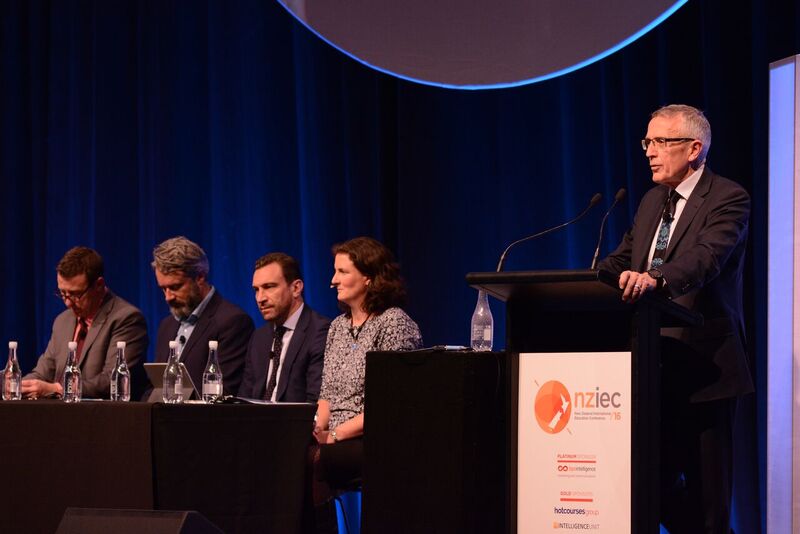31 August 2016 at 9:00 am
NZIEC: What we learned from the panel sessions
The oustanding MCs from each panel session, Paul Irwin, Clive Jones and John Goulter, each share a summary and key insights from the day.

Moving Places: Fostering the employability of international graduates
Panel MC, and ENZ General Manager Stakeholders, Communications and Intelligence, John Goulter, offered this report.
This session was focussed around what international students do after they graduate, and ways to ensure the best outcomes. The desired endpoint is for New Zealand to attract the very best international students to New Zealand for a high value, high quality education.
Emily Fabling, International Director at the Ministry of Education, outlined some hot-off-the-press research and shed some light on the international students who stay on to work in New Zealand.
Other panellists, including Kirk Hope from Business New Zealand and Steve McGill from Immigration New Zealand, discussed ways to ensure that international education plays to New Zealand’s strengths.
Darryn Melrose, Chief Executive of the Media Design School, explored ways to tailor products to attract the best students and produce graduates who are truly equipped for the needs of the job market, both in New Zealand and internationally.
There was a broad consensus that as a small country, New Zealand has the opportunity to develop niche markets and educational products. Many graduates will return to their home countries to build careers, others will go on to other countries for more education, but some will stay in New Zealand to make a long-term contribution to our economy and wellbeing.
The presentation slides of Moving places: Fostering the employability of international graduates are available to download here.
Overcoming the trials and tribulations of offshore delivery
Panel MC, and ENZ General Manager Business Development, Clive Jones, offered this report.
This panel featured four inspiring contributions from Selena Fox from New Zealand Tertiary College, Maria Johnson from Little Schools, Andrew Short from Cognition Education, and Ed Weymes of Waikato University.
While previous panels have tended to be tertiary focused, this panel had a heavy emphasis on the potential of New Zealand early childhood education and schools in offshore delivery. This could be through teacher training, establishing campuses, or the management of international schools using New Zealand’s expertise.

Clive Jones, General Manager Business Development, ENZ
The panellists outlined a common set of success factors needed, including:
-
New Zealand playing to its strengths
-
Understanding and meeting a market need
-
The critical role of in-market partners
-
The role of technology in supporting learner success
-
Retaining control of critical elements of the education and training offering in order to protect your reputation.
We had a very engaged audience, with a growing interest in understanding opportunities for New Zealand providers in the offshore delivery of training and education.
If you are interested in understanding more about offshore delivery opportunities, come and talk to ENZ and we can provide advice, guidance and connect you to experienced practitioners such as our panel members.
Social licence: International education and New Zealand communities
Panel MC, and ENZ General Manager Marketing and Channel Development, Paul Irwin, offered this report.

In order to build a sustainable international education industry in New Zealand, we will need the ongoing approval and acceptance of local communities to operate and grow.
This session explored ways to build social licence and to get New Zealanders not only supporting but endorsing the growth of international education.
Deborah Gray, GM Corporate Affairs, Tourism New Zealand, presented an interesting analysis of Tourism New Zealand’s learnings from its Visiting Drivers programme. She emphasised that building social licence is a long game.
Paul Irwin, General Manager Marketing and Channel Development, ENZ
We explored ways to use storytelling to build social licence, with New Zealand education providers, regional bodies and students all playing a key role. It is important to show the contribution students make when they are in another country, as well as the connections they make with employers (through internships, for example).
ENZ has recently commissioned research into New Zealanders’ perceptions of international education, with some 70 per cent supporting a New Zealand that is open-minded, friendly and welcoming. Reflecting this behaviour and value back to Kiwis is an opportunity for our story telling. ENZ is finalising the report with the researcher and will share it with industry in the next month.
The presentation slides from Social licence:International education and New Zealand communities are available to download here.

